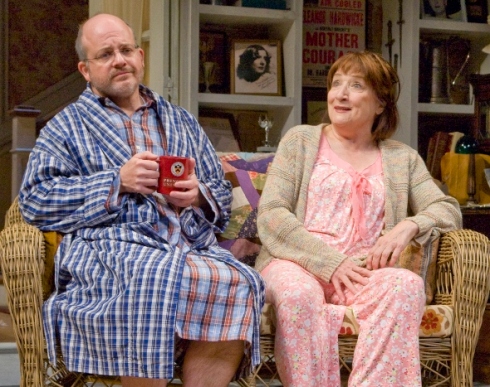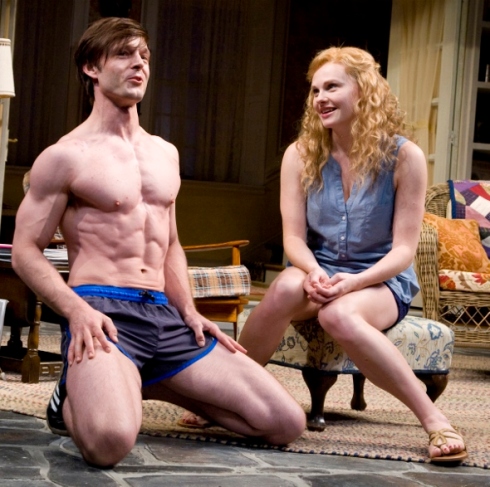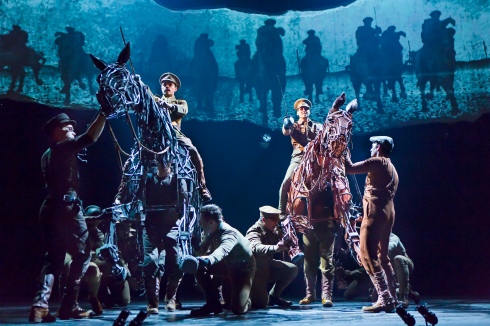By JOHN DeMERS
The first playwright to parody Chekhov on a regular basis was, well, Chekhov. And there’s been a small but ever-vibrant theatrical cottage industry doing so ever since. What else are you going to do with a guy who has characters announce Big News like “I’m in mourning for my life!”
That line, several others borrowed from the master himself and a whole bunch created in his style and/or honor fuel the constant humor and occasional pathos of Christopher Durang’s Vanya and Sonia and Masha and Spike, which opened last night at Houston’s Alley Theater. If any additional bittersweetness were required, a la Chekhov’s Cherry Orchard, the theater itself is about to be closed for a yearlong renovation and modernization, with next season to be performed at the University of Houston. That’s a whole lot like The Cherry Orchard, in fact.
Durang’s play picks both low-hanging and hard-to-get fruit from the Russian playwright’s greatest hits album – from the jealousies and hysterias of people “wasting” their lives to the serio-comic desperations of people the world assumes are happy. Hope and despair lurk side-by-side under every rock around the inherited country house in Pennsylvania whose upkeep is paid for by semi-talented movie star Masha but that’s lived in by her brother Vanya and adopted sister Sonia. The two siblings have done little with their adult lives except ease their parents’ final years; with them gone now, the two see nothing of interest on the horizon. On any given day, it seems, that is or is not okay – the source of much utterly Chekhovian angsting over “what’s it all about.” At the same time, the play’s early scenes are both send-ups and serious – until Masha turns up for a visit, with her latest boy toy Spike in tow in the aftermath of her five failed marriages.
No further background is required (really, probably not even that) to thoroughly enjoy Vanya et al as directed by Jonathan Moscone. The Alley does this comedy the way it does virtually every comedy – full-bore, over-the-top, with the company’s greatest fear being a moment when nobody is shouting, over-emoting, throwing something or falling down. At important junctures, it seemed to me that a little more “dare to bore” might have been good for Durang’s play, to let its serious or even profound observations sink in. Still, there’s no doubt this is a wickedly funny evening of theater, whether you know your Chekhov backwards, forwards and sideways, or not at all.
Jeffrey Bean and Sharon Lockwood are terrific as the life-becalmed brother and sister, channeling every family member trapped amidst nature’s beauty between The Seagull and On Golden Pond. Lockwood is pitch-perfect near the end, when she receives what may be her first-ever phone call from a suitor, a tangle of contradictory emotions that together point the way toward hope. And Bean is dazzling in his otherwise bizarre monologue attacking technology and the isolations of modernity in preference for Ozzie and Harriet (you can Google them, children), Mickey Mouse Club and coonskin caps. Last night’s audience, most of whom could remember and prefer right along with him, felt little choice but to applaud the sentiment.
Josie de Guzman follows the Alley party line in terms of comic style, being goofy and loud and more than a little manic in her desperation, while Jay Sullivan does a fine job of playing Spike in limited amounts of clothing, making every guy in the audience feel dreadfully out of shape. Sarah Nealis is idealistic and touching as Nina, the young acting hopeful who takes an affectionate “Uncle Vanya” interest in Bean’s character – while Rachael Holmes as Cassandra rules the stage every time she’s given some new hilariously dark pronouncement to make. As the family’s “cleaning lady,” she’s a soul sister who’s wandered into Greek tragedy by accident. And like so many of us in the Chekhovian sense, she’s fallen and she can’t get up.
Photos by Jann Whaley: (top) Jeffrey Bean and Sharon Lockwood; (bottom) Jay Sullivan and Sarah Nealis.





